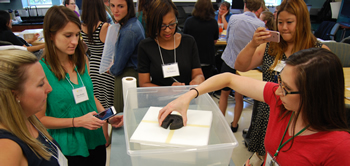 The Notre Dame Center for STEM Education engages in interdisciplinary research focused broadly on topics of STEM teaching and learning. Research is conducted collaboratively among faculty and students across campus and with institutions around the United States.
The Notre Dame Center for STEM Education engages in interdisciplinary research focused broadly on topics of STEM teaching and learning. Research is conducted collaboratively among faculty and students across campus and with institutions around the United States.
Trustey Fellows
The Trustey Family STEM Teaching Fellows is a central program of the Center that develops school-teams of teachers’ capacity to effect change in STEM education in their contexts. In addition to a longitudinal professional development community, the program is committed to rigorous quantitative and qualitative research focused on a range of teacher and student outcomes such as better understanding the development of teacher leaders, relating changes in instructional practice to student outcomes, and charting organizational and cultural change via STEM.
Projects
Click the title of the project to view the description.
Addressing Disciplinary Content and Practices within STEM Integration
Addressing Disciplinary Content and Practices within STEM Integration
Over the past decade, there has been an increasing focus on integrated STEM learning environments, where students are typically asked to engage with more than one STEM discipline in order to solve a specific problem situated within a real-world context. Breaking away from the traditional instructional model of siloed courses and learning experiences within science and mathematics departments, schools and teachers are seeking new models for implementing STEM integration, including innovative solutions involving collaborating teachers, block scheduling, and creating new integrated STEM courses. However, many questions still remain about what the best curricular and instructional practices are for STEM integration, as well as how teachers can overcome barriers to effectively implementing these types of experiences for students.
As part of the Trustey STEM Teaching Fellows program, teachers receive professional development around STEM Integration during their first two summer institutes. This study explores several facets of this work, including what obstacles teachers are most likely to face when conceptualizing, implementing, and assessing STEM integration, how both disciplinary content and practices can be woven together in these experiences, and how situating STEM Integration within a social justice-oriented context can impact learning outcomes.
Core Practices: UPTAKE
Core Practices: UPTAKE
Research on teaching practice has recently gained attention as an effective lever for improving student engagement and achievement. Recent studies have shown that even more than years of teaching experience or degree held, the instructional practice that occurs in K-12 classrooms is the best predictor of student learning. Given the limited amount of time and resources available for preparing new teachers, identifying and helping novices take up a small set of effective, content-specific practices, has great potential for improving the education of students in our nation's schools.
This program of researching draws on the emerging work of core instructional practices. Fueled by work with the Core Practice Consortium (https://www.corepracticeconsortium.com/), this series of studies focuses specifically on how science teachers learn and engage core practices like facilitating sensemaking discussions and how students participate in these experiences.
Conferences
-
2017_NARST_San Antonio, TX
Kloser, M., Gottlieb, J., Wilsey, M., Svarovsky, G. N., Kirkland, P., Puricelli, J. (2017). Exploring the relationship among middle grade teacher’s conceptions of STEM and equity. A Paper for the Annual Meeting of the National Association of Research on Science Teaching. San Antonio, TX.
AP-TIP IN
As the primary program for supporting teachers and students engaged in Advanced Placement courses in Indiana, the AP TIP research agenda draws on extensive data sets to better understand the impact of the program, especially on underrepresented populations in STEM. Drawing on both quantitative and qualitative data, this research explores the overall impact of the program during and beyond high school as well as the impact of the program’s various components.
Projects
Click the title of the project to view the description.
AP-TIP IN
AP-TIP IN
Given the exceptional impact among initial AP-TIP IN cohorts and its long-term investment in young talent in the state of Indiana, the Indiana Advanced Placement Teacher Investment Program (AP-TIP IN) received funding support from the Lilly Endowment to further develop and expand AP-TIP IN’s program in Indiana, and provide time to implement a longitudinal sustainability plan. This plan consists of four concurrent components: (1) implement the AP-TIP IN program in new schools; (2) communicate results to stakeholders and the public; (3) obtain governmental agency support; and (4) develop partnerships. This comprehensive strategy will result in a fully-supported program that fosters STEM-focused, college and career readiness program at Indiana schools through public-private partnerships.
AP-TIP IN- Cohorts 4 and 5
AP-TIP IN- Cohorts 4 and 5
AP-TIP IN received funds from the Indiana Commission for Higher Education to implement its professional development and support programs at 17 Indiana high schools representing 16 school corporations.
AP-TIP IN will support schools to grow their AP MSE programs using a tool, will provide professional development events to aid teachers to hone both content and pedagogical content knowledge in AP MSE courses, and will provide Content Staff mentoring and support such that teachers are more effectively able to teach AP MSE courses at program schools. The outcomes expected are an increased number of students who participate in AP MSE courses, an increased number of students who earn AP MSE qualifying scores, and the development of AP MSE teachers who are highly qualified and successful at teaching their AP MSE courses.


